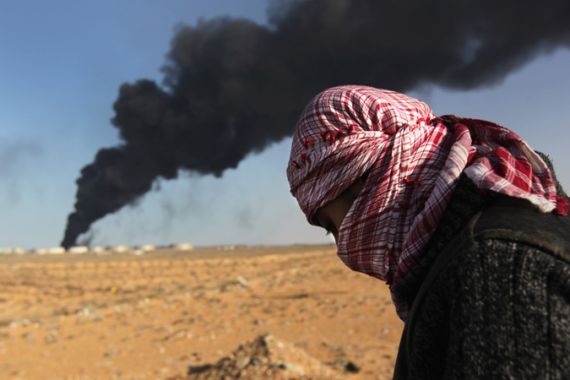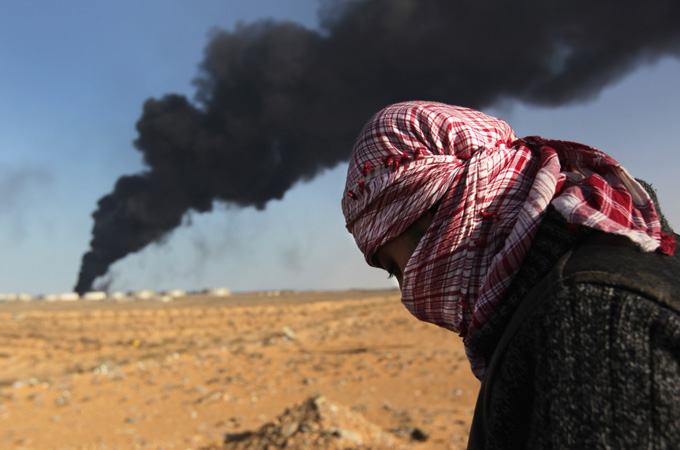Qatar recognises Libyan rebels after oil deal
Qatar is first Arab nation to recognise Benghazi-based council after rebels announce oil marketing deal with Gulf state.

 |
| Rebel forces in Libya control oil supplies in the east of the country [GALLO/GETTY] |
Qatar has recognised Libya’s rebel council as the legitimate representatives of the Libyan people, a day after the group announced an oil contract with the Gulf state.
The move on Monday makes Qatar only the second country to formally recognise the Libyan rebel council, but has been backed by the Gulf Co-operation Council (GCC).
Keep reading
list of 4 itemsWhy is Germany maintaining economic ties with China?
Behind India’s Manipur conflict: A tale of drugs, armed groups and politics
China’s economy beats expectations, growing 5.3 percent in first quarter
A statement from Abdulrahman al-Attiyah, the outgoing GCC secretary general, said Qatar’s “recognition of the transitional council as the only legitimate representative of the Libyan people comes in line with the decisions of the GCC”.
“The Libyan system has lost its legitimacy,” said al-Attiyahi.
Qatar also has warplanes taking part in UN- and Arab League-backed air raids aimed at imposing a no-fly zone over Libya, and has urged Gaddafi to quit to avoid more bloodshed.
France previously recognised the rebel council as the legitimate representative of Libya, the first and so far only Western power to do so.
Libyan state television condemned Qatar’s recognition of the rebel council, saying the move amounted to “blatant interference” in Libyan affairs.
Oil contract reported
Qatar’s recognition of the rebel council comes just a day after a senior rebel official said that Qatar Petroleum had agreed to market crude oil produced from east Libyan oil fields no longer under the control of Muammar Gaddafi, the Libyan leader.
“We contacted the oil company of Qatar and thankfully they agreed to take all the oil that we wish to export and market this oil for us,” said Ali Tarhouni, a rebel official in charge of economic, financial and oil matters.
“Our next shipment will be in less than a week,” he said, speaking from the rebel-held city of Benghazi.
Qatar’s state-owned oil company has not confirmed the deal.
Manouchehr Takin, from the Centre of Global Energy Studies, told Al Jazeera that the deal, if confirmed, would be “a landmine, legally speaking”.
“Is this council representing the Libyan people? Only two countries have accepted that. Whether we like it or not, the Tripoli government, by the United Nations, is [still] the legitimate and sovereign government,” he said.
“There is also no mechanism for this – there’s no central bank [for the rebels], there’s no ministry of finance … I think it’s a very risky commercial venture for any company to come and buy this oil.
“And if the Tripoli government remains in power they will probably take legal action over the sale of this oil.”
Libya produced about 1.6 million barrels of oil per day before the crisis, or almost 2 per cent of world output.
Most of the oil is in the east, but sanctions and the lack of a marketing operation have stopped the rebels selling it abroad.
Libya relies heavily on oil exports, which pay the state salaries on which most families depend.
Sanctions struggle
Tarhouni said output from the Libyan oil fields controlled by rebels is running at about 100,000 to 130,000 barrels per day, which could be increased to 300,000.
The Reuters news agency reported officials at eastern oil firm Agoco as saying that the company was pumping most of the oil produced in the east to the terminal in Tobruk in the far east of the country.
Output at its fields, including Nafoora, Sarir and Misla in the Sirte Basin, fell in recent weeks as an absence of shipments since early March led to a build-up of stocks at Tobruk.
Agoco had said it aimed to begin marketing its oil abroad before ceding the plan to the rebel national council.
The plan seemed to have hit a stumbling block when Agoco was named along with 13 other Libyan companies targeted by US sanctions designed to cut off funding to Gaddafi.
Tarhouni, a US-based academic and exile opposition figure, was designated last week by the Benghazi-based national council to steer its financial and oil policy.
